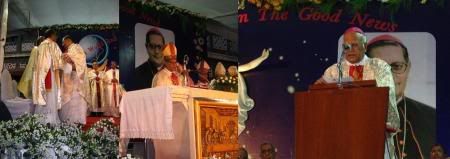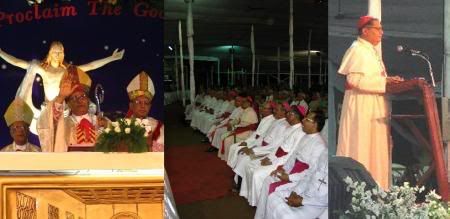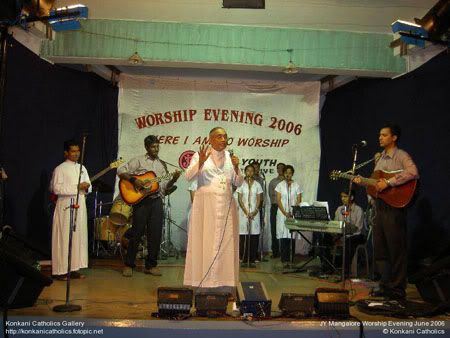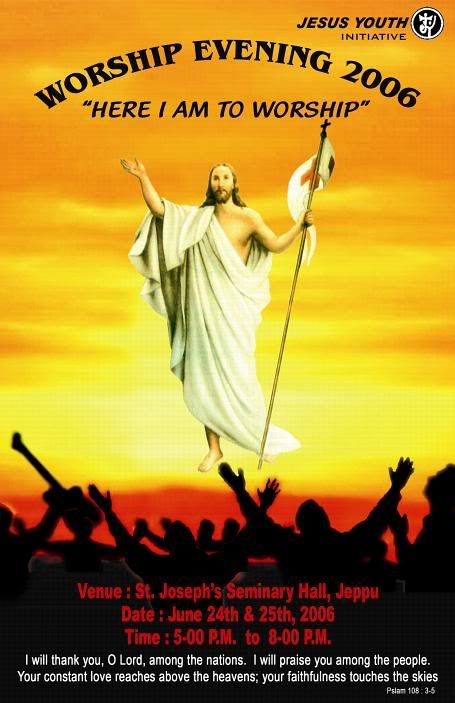As Christ's Vicar On Earth, Pope Is Fully Competent To Speak On Religious Freedom: Cardinal Dias
Mumbai, June 14, 2006 (CBCI News):
Responding to a spate of responses to Pope Benedict XVI's recent remarks on freedom of religion in India, the newly appointed head of Vatican’s Congregation for Evangelization of Peoples, Cardinal Ivan Dias asserts - as Christ's Vicar on earth and as the first citizen of Vatican, Pope is fully competent to speak on the issue.
The following is the statement issued by Cardinal Ivan Dias:
THE HOLY SEE AND VATICAN
In some of the reactions to Pope Benedict XVI's recent remarks on freedom of religion in India, he was criticised for intruding into the internal affairs of a sovereign nation and for acting ultra vires as the head of the Vatican City-State. Besides the considerations which have been previously made in The Examiner (May 27, 2006) apropos the subject touched upon by the Holy Father, it would seem wise to clarify - from a Catholic perspective - certain notions about the role he plays in the world at large as Christ's Vicar on earth and as the first citizen of the Vatican.
Biblical Background
We must go back to the Sea of Galilee some two thousand years ago when Jesus, who had just finished addressing a multitude of people from the barque of Peter, bade him to launch out into the deep and to lower the nets for a catch. After a moment of curious surprise - at a request coming from a carpenter-preacher to a seasoned fisherman who had toiled all night and caught nothing (was it, perhaps, an unwarranted interference with his competence!) - Peter cast down the nets and, all confused by the big haul he made, fell at Jesus' feet and begged Him to go away from a sinful man. But Jesus reassured him saying: "Do not be afraid; henceforth, you will be a fisher of men" (cf Lk 5:1-10). This change, from fisherman to a fisher of men, is indeed significant. Later on, Jesus would explain the meaning of this new office with another metaphor: "You are Peter, the rock, and on this Rock I shall build my Church, and the gates of hell shall not prevail against it. I will give you the keys of the kingdom of heaven; whatever you will bind on earth shall be bound in heaven, and whatever you will loose on earth shall be loosed in heaven" (Mt 16:13-20). After His resurrection, Jesus confirmed Peter in this office saying: "Feed my lambs.. Feed my sheep" (Jn 21:15-19), notwithstanding the fact that Peter, in a moment of weakness after Jesus' arrest in the garden of Gethsemane, had thrice denied that he ever knew Him. Being God-made-man, Jesus' flock is the whole human race, for whose sake He died on the Cross at Calvary.
The Holy See
It is gratifying to note that, in a world where human, moral and ethical values are being constantly tossed high and low on the stormy seas of life, Jesus wished that Peter be, like a lighthouse on a rock, His authoritative spokesman - His Vicar on earth - enlightening the course of humanity. And so it has been all down the centuries till today through Peter's successors, the Popes. The moral and spiritual authority vested in the Pope is normally referred to as The Holy See: the term "see" (which means seat) symbolically signifies the chair from which teaching is officially imparted, laws are promulgated and judgements pronounced, something akin to the stools of the tribal chiefs in Africa, the thrones of the kings in Europe and the peets from where Indian gurus teach their disciples with authority.
Strictly speaking, the Holy See or the Apostolic See is the ministry of the Pope who has a double sovereignty: as Pastor of the universal Church and as Head of the Vatican City-State. In a broad sense, the Holy See includes the departments (dicasteries) of the Roman Curia which collaborate with the Pope in the governance of the Church (can. 361 in the Code of Canon Law). The Holy See is thus the central governing body of the Catholic Church, whose head is the Pope, the Bishop of Rome, and it is precisely in the exercise of this function that it enjoys international recognition. The Holy See is also the supreme authority of the Vatican City-State, as will be explained further below. The Pope has a special place in the comity of nations, and he is universally acknowledged as an authoritative point of reference when he speaks on dogmatic, spiritual, moral and ethical issues: these statements are not always infallible, except when he speaks ex cathedra. He commands the respect of all the nations, even of those who disagree with his views. In this he represents the Holy See, and not the Vatican City-State. His pronouncements are mainly on human rights, life and death issues, morality in and out of marriage, questions of justice, truth and peace.
The Holy See, not the Vatican City, maintains diplomatic relations with 174 nations and participates in various international organizations. Foreign embassies are accredited to the Holy See, not to the Vatican City, and it is the Holy See that establishes treaties and concordats with other sovereign entities and, when necessary, even on behalf of the Vatican City. Due to the very limited territory of the Vatican, embassies to the Holy See are located outside that City-State in the Italian part of Rome. Italy too has its own Embassy to the Holy See. While the Vatican is a subject of international law and is a member of some international organisations, like the Universal Postal Union (UPU) and International Telecommunications Union (ITU), the Holy See participates in many entities, both governmental and non-governmental, as a member, observer or permanent representative, e.g. United Nations Organization (UNO), The European Council, United Nations Education, Science and Culture Organization (UNESCO), International Atomic Energy Agency (IEAE), etc.
As the Holy See does not have any political or commercial ambitions to further, it is much appreciated by everyone for its supra-national approach and its substantial contribution to the international community's quest for world peace and security, especially since there are matters and values which transcend national boundaries and which concern the world body of nations as a whole. Among these are human rights issues, wars and consequent refugee problems, terrorism, child labour, drug trafficking, air-flight safety, maritime fishing, etc. Common policies on these matters are often drawn up in declarations and statements having a universal character: e.g. the United Nations Universal Declaration of Human Rights (10 December 1948) wherein it is stated: "Everyone has the right to freedom of thought, conscience and religion; this right includes freedom to change his religion or belief, and freedom, either alone or in community with others and in public or private, to manifest his religion or belief in teaching, practice, worship and observance" (Art.18). It is for this reason that the Holy See is held in high esteem all over the world. It is noteworthy that Article 16 of the international Vienna Convention on Diplomatic Relations (18 April 1961), while stipulating that the Heads of Diplomatic Missions (Ambassadors) in a given State should be given precedence according to the order of their presentation of credentials to the Head of that State, has a clause which makes a unique exception for the Pope's Ambassador (Apostolic Nuncio), stating that "this article is without prejudice to any practice accepted by the receiving State regarding the precedence of the representative of the Holy See".
The Vatican City-State
The place where the Pope resides at present is a very small territory in Rome, called the Vatican. Rome has always been the normal residence of the Popes, albeit in various locations, because the tomb of Peter, the first Pope, lies there on Vatican Hill. In times past, when the Italian peninsula was made up of many feudal states, some of them paid allegiance to the Pope as their temporal sovereign. But, when the Papal States were suppressed after the invasion of Rome by the troops of the King of Piedmont in 1870, the Pope was "confined" to the Vatican Palace. It was then that some uncertainty arose among jurists as to whether the Holy See, without territorial sovereignty, could continue to act as an independent personality in international affairs. The State of the Vatican City was therefore created with the signing of the Lateran Pact between the Holy See and the Italian Authorities on February 11, 1929 to "ensure the absolute and visible independence of the Holy See" and "to guarantee to it an indisputable sovereignty in international affairs" (quotes from the treaty). Archbishop Jean-Louis Tauran, the Holy See's former Secretary for Relations with States, said that the Vatican City is a "miniscule support-state that guarantees the spiritual freedom of the Pope with the minimum territory".
The Pope is the head of the tiny Vatican City-State, which covers an area of 44 hectares (108.7 acres) and hosts some world-renowned sites: among them, St. Peter's Basilica, The Apostolic Palace, Vatican Museums with the Library and Secret Archives, Paul VI Audience Hall, The Governor's Palace. Providing a territorial identity for the Holy See, the Vatican City-State is a recognized national territory under international law, with its own flag, anthem, postal stamps, coins, security (famous Swiss Guards), health services, bank, tribunal, railway station and administrative offices.
The Vatican City is, therefore, a purely technical entity of a juridical nature, to be understood in the context of the permanent international recognition which the Holy See has always enjoyed, both before the creation of the Pontifical States and even after they ceased in 1870. At that time, the Vatican City-State did not exist. This permanent international recognition of the Holy See is proof enough that States and Governments looked at the Holy See, not primarily as a territorial entity, but as an international juridical reality, whose foundation was the spiritual sovereignty of the Church exercised through the ministry of the Pope. The basis of this sovereignty is to be found in valid juridical and social arguments concerning an organism that has existed through many centuries as a real juridical sovereignty analogous, but not identical to, that of a State: for it is an association of people with its own special organization (i.e. based on spiritual values and with a hierarchical structure), which follows an independent goal and can freely adopt the ways and means it considers necessary for its mission and unity. In short, the Church is an entity sui generis, and is recognized as such by international agreements.
The Catholic Perspective
To summarise the Catholic perspective exposed above: The Holy See has existed ever since Peter was mandated by Christ to take care of His flock, which is the whole human race. The Vatican City-State exists only since 1929. It would, therefore, be wrong to attribute to the Pope as head of the Vatican City-State the statements he makes in virtue of his authority as Christ's Vicar on earth (Holy See): just as if, in the case of Peter cited above, one would confuse the fisherman and the fisher of men in him. People everywhere are normally quite aware that the Pope's role as head of the Church (Holy See) is quite distinct from that of first citizen of the Vatican: for instance, when they listen to the Pope's speeches or when they react to various papal events, such as the sight of the hundreds of thousands of persons who come to Rome from the five continents wishing to attend a papal audience; the anxiety of the millions around the globe who followed the radio and television bulletins for over a week as Pope John Paul II's life was slowly ebbing away and the sadness which prevailed all over the world when he died and at his funeral service; the enthusiasm with which countless of persons witnessed the election and inaugural ceremonies of his successor, Pope Benedict XVI.
Re-reading Pope Benedict XVI's remarks on religious freedom in India - which were made within the context of a speech filled with appreciation of and praises for the Indian nation - one cannot but sense the Holy Father's deep concern at the negative attitude taken by certain politico-religious groups vis-à-vis the innate fundamental rights of the Indian people, which are also enshrined in the United Nations Universal Declaration of Human Rights, are guaranteed in the Indian Constitution and reflect the spirit of India's founding fathers. This is fully within the competence of the Pope (Holy See). His observations, however, are all the more relevant when one considers the deep yearning of the Indian soul as expressed in the Brihadaranyaka Upanishad: "from untruth lead me to the truth, from darkness lead me to the light, and from death lead me to immortality" (1.3.28). While sincerely appreciating the "seeds of the truth" which are found in all religious traditions and which await their full blossoming, Christians believe that only Jesus Christ can fully satisfy the inner longing of the human heart to pass "from untruth to truth" because He is the Truth; "from darkness to the light" because He is the Way and the Light of the World, and "from death to immortality" because He is Life in abundance. In fact, in reply to a question posed by the Apostle Thomas at the Last Supper, Jesus told His disciples: "I am the Way, the Truth and the Life" (Jn 14:6). And it was precisely Thomas who, in God's providence, would later bring this Good News of Jesus Christ to the Indian sub-continent.
+ Cardinal Ivan Dias
MumbaiSource: CBCIsite.com
Also See:










